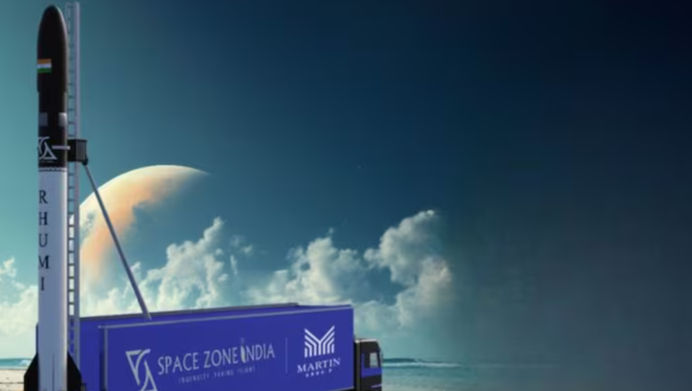New Delhi: On Saturday, August 24, India achieved another milestone in the space sector by launching its first reusable hybrid rocket, RHUMI 1. The rocket, developed by Tamil-Nadu-based startup Space Zone India and Martin Group, was launched from Thiruvidandhai in Chennai using a mobile launcher.
The rocket carries 3 Cube satellites and 50 PICO satellites on a suborbital trajectory.
In a post on X, the Martin Group said, “Rhumi-2024 Mission: India’s Reusable Hybrid Rocket Lifts Off! Join us on August 24 at 7 am as Space Zone India, in collaboration with the Martin Group, unveils its groundbreaking achievement – the country’s inaugural Reusable Hybrid Rocket. Designed for flexibility and reusability, this mobile launch will propel three Cube satellites and fifty PICO satellites into a suborbital trajectory.”
He also highlighted the key features of the rocket.
Adjustable launch angle:
The rocket’s launch angle can be precisely adjusted between 0 and 120 degrees, providing precise control over its trajectory.
Educational impact:
Students from various regions of India, including government schools, have participated in free workshops focusing on rocket and satellite technology.
CO2 activated parachute system:
This innovative, affordable and environmentally friendly descent mechanism ensures safe recovery of rocket components.
Applications beyond space exploration:
The technology has broader applications beyond space exploration, including use in agriculture, environmental monitoring and disaster management.
According to the startup group’s post, this is the third collaboration between Martin Group and Space Zone India.
Earlier he collaborated on ‘2023 for the ‘Dr. APJ Abdul Kalam Student Satellite Launch – 2023′ mission, over 2500 students from government, tribal and public schools across the country became part of a team that designed and built a student satellite launch vehicle (rocket) mission containing a payload of 150 PICO satellite research experiment cubes,’ he said.
Later in 2021, both of them collaborated for the ‘Dr APJ Abdul Kalam Space Research Payload Cubes Challenge 2021’ where they successfully launched 100 FEMTO satellites developed by 1200 students.
(This is a cutting-edge copy, more details are expected)
Disclaimer:
The information contained in this post is for general information purposes only. We make no representations or warranties of any kind, express or implied, about the completeness, accuracy, reliability, suitability or availability with respect to the website or the information, products, services, or related graphics contained on the post for any purpose.
We respect the intellectual property rights of content creators. If you are the owner of any material featured on our website and have concerns about its use, please contact us. We are committed to addressing any copyright issues promptly and will remove any material within 2 days of receiving a request from the rightful owner.

